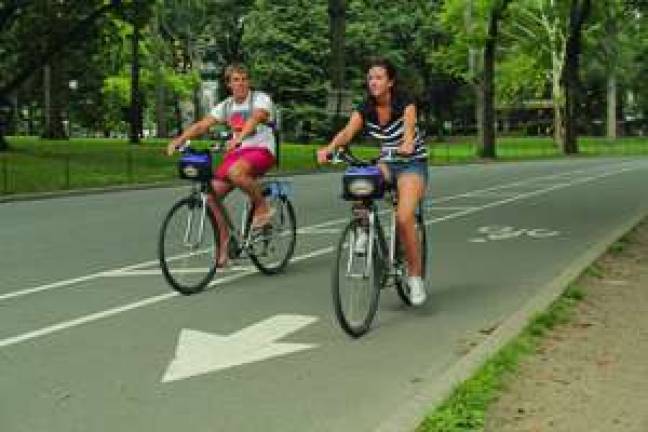Harassed Out of Business?

Bike rental places, often accused of aggressive tactics, fear that Citi Bike will take them out By Rebecca Harris Columbus Circle, a popular access point at the southwest corner of Central Park, regularly swarms with aggressive bike rental merchants, hounding passersby like handbag salesmen peddling their wares on Canal Street. Desperate to make sales as it is, some of these people fear their livelihoods will be threatened when Mayor Michael Bloomberg's new Citi Bike program takes effect. The bike share is being billed a commuting alternative for New York City natives, designed for short-term bike use only-a mode of transportation from point A to point B, with individual rides over 30 or 45 minutes, depending on the package purchased, incurring overtime charges. It follows a model that has been used with success by cities across the United States and around the world. "It's just like you would use the subway-it's a public transportation system," said Michael Murphy, communications director for Transportation Alternatives, an organization that advocates non-motorized means of traveling within the city. In theory, Citi Bike would not be used for leisurely, lengthy rides through Central Park. Still, with rates comparable to those of local rental stores and the availability of a 24-hour pass, some out-of-town riders said they would be tempted to opt for the hassle-free city option. "If they were safe, convenient and affordable, I would very likely use [Citi Bikes] instead," said one woman, a Charlotte, N.C., native who was biking with her family last week in Central Park. "Especially if you could just stick your credit card in and go and avoid having people harassing you like they do here, it would be much less of a hassle." She noted that Charlotte had recently launched a pilot test of their own bike share-the program officially opened on Wednesday-and praised the system, which follows a similar model to its New York counterpart. John Henderson, a lifetime New Yorker and an employee at Central Park Bike Rentals, said that although he believes the program will be good for the city, he is afraid that it could "tremendously and negatively impact" how he makes his living. "It's going to take the food out of our mouths, really," he said. "This is how we make our livelihood, how we make our trade. It's going to be very difficult for us." Other vendors said they cannot know what the bike share has in store for their business until it happens, but hope that if the program truly caters to locals and not to tourists, it will not chip away too much at their customer base. Andrew McKenzie, an employee at Bike and Roll, the only establishment at Columbus Circle at which available bikes rest in a visible bay rather than an off-site location, expressed confidence that Bike and Roll will not suffer extensively from the competition Citi Bike might pose. "We're already established, people know about us. We do have locals come here and we have locations all over the city," he said. "We really offer the same services that the Citi Bike share will. We have good visibility, people can see all of our bikes here, they can pay with a credit card. It's convenient and we're well-known." Still, McKenzie's optimism will be put to the test once Citi Bike is up and running. Many customers renting bikes to ride in Central Park, including visitors whose home cities have successful bike share programs underway, said emphatically that they would choose to rent bikes from the city if given the option. Helen Marmilic, another tourist who ventured to Central Park last week to bike, said she and her husband would choose a city bike option over a local rental establishment because of a presumed upgrade in quality. "I would be more likely to use the city bikes because I assume they would be better quality," she said. "We're avid bike riders, and let's just say these [local rental] bikes leave a lot to be desired." The couple, who hails from Melbourne, Australia, also has experience with a bike share of their own. Melbourne launched its program in 2010, and Marmilic said her family has frequently made use of the option at home. One bike renter expressed skepticism that Citi Bike would be implemented at all in the near future, citing repeated delays that have stalled the program this summer. The program had an initial launch scheduled for July; it was later pushed back to August. Now, the city will not give an exact start date. The Department of Transportation said last week that a launch plan was underway, but did not provide further details as to the cause or extent of the delay. "The delay has sparked such questioning and interest because of overwhelming demand for this program," Murphy said. "I hope they meet that demand as quickly as they can, but I would rather they do it right than do it fast." When the program does launch, there will be no bike stations located on the Upper West Side. The most uptown docking bay is located just on the southeast edge of Central Park, and the tentative map on the Citi Bike website shows two locations at Columbus Circle. The DOT received numerous suggestions for locations in the neighborhood further uptown but did not answer questions about how the decision was made to keep bike sharing out of the Upper West Side for now. Murphy said he believes the complete absence of stations further uptown is a result of lower demand for a bike share in those neighborhoods. He added that he hopes the docking bays will eventually expand to all parts of the city. "They can't just drop them out of the sky all at once. The rollout is starting in locations where there is more demonstrated demand, around the Central Business District," he said. "We hope to eventually have a five-borough bike share program, but obviously that will have to happen in stages."